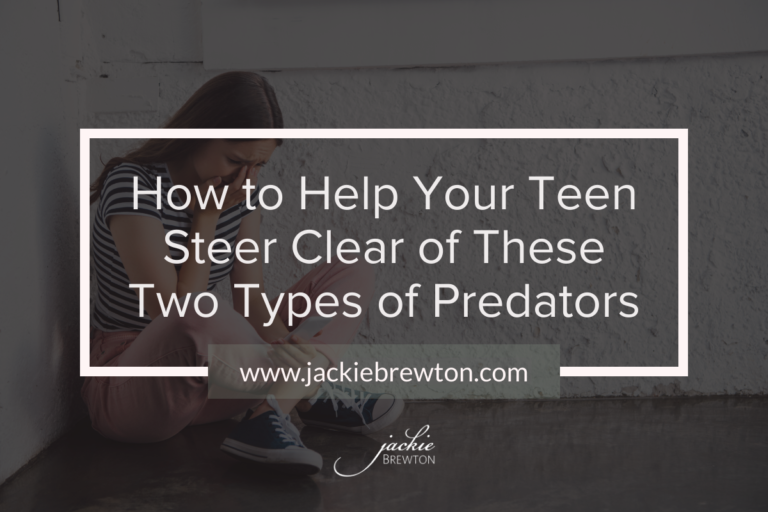Sexual Assault: Breaking the Cycle of Secrecy Among Our Girls
As unfathomable as sexual assault is, there’s another ugly truth that we must acknowledge.
Many teen girls have been carrying around the secret of their rape or molestation since they were little girls.
Today in part three of my series for Sexual Assault Awareness & Prevention Month, I want to focus on the cycle of secrecy that so many of our girls find themselves trapped in.
Remember in my first post of this series, when I shared with you an activity that I do at the beginning of student assemblies with all girls?
I did that enlightening “Please Stand Up If…” activity at a middle school one day and I could see on some of the girls’ faces that they weren’t standing because they knew someone.
They were standing because they were THAT GIRL who had been raped or molested…most likely when they were younger, by someone much older.
At every all-girls assembly, when the girls sit down I take some time to address the topic of rape/molestation:
I tell them that, based on the statistics, I recognize that some of them have been victims.
Then I explain to them that…
…it was not their fault
…they are not damaged goods
…and, in my opinion, they still have the right to call themselves a virgin if their virginity was taken from them by rape.
I also state that I know that some of them have never told anyone about it.
I know this because of the number of letters that I get from girls who tell me they’ve never told.
Then I say the following:
“I don’t know your reason for not telling. Maybe the perpetrator told you that he would harm you or a loved one if you told. Maybe he told you that you would get in trouble or no one would believe you. Just know that whatever you were told was a lie. It’s just a trick to keep you silent.”
As adults, you and I both know that silence isn’t always golden.
Unfortunately, innocent little girls don’t.
Why the Secrecy Harms NOT Helps
Young survivors need to know that while it may seem like keeping their assault a secret is in their best interests, it’s not.
And here’s the problem with survivors keeping their assault a secret:
- When girls don’t tell anyone, they’re also not getting counseling and may begin to medicate their pain in harmful ways. In other words, girls who keep their assault a secret give the person who raped them in the past the power to also affect their future.
“At the age of 5 or 6, I was sexually molested and victimized into doing physical sexual activities. This also led to me getting into many physical sexual encounters that led me down the wrong path as I got older. You encouraged me to change my life and to become a better person. I no longer try to weasel my way into having sex and I also stopped doing sexual things.”
- When girls don’t tell anyone, the perpetrator is still free to do the same thing to another victim. I encourage them to tell their mothers in hopes that eventually justice will be served and the perpetrators won’t be free to attack anyone else.
“I don’t tell people this, but I have been sexually abused from the age of seven to seventeen. Thanks to you for making me feel value in myself, I have confronted my abuser. I do not wish to see this person in my life anymore and I let them know that. Keep doing what you are doing; you may save another victim like me. With love, abused no more.”
The Secret to Breaking the Cycle of Secrecy
As if overcoming the unthinkable act of rape or molestation isn’t enough for a little girl (or boy), far too many young survivors are left to carry around the added burden of keeping their assault a secret.
I wish I had the answers on how we can prevent sexual assault from ever happening to another child.
But I do know that if we ever want to break the cycle, we must confront the secrecy.
Perpetrators hold all the power when they lie and threaten little girls into remaining silent.
But young survivors can take back their power the minute they tell their secret.
And who better to tell than their mothers?
That was the case for the girl I mentioned last week who felt like her relationship with her mom grew closer when she finally worked up the nerve to share her secret.
I’m so thankful that she heeded my advice and told her mom.
But in a perfect world, she would have told her mother first. Not me.
As long as I continue to receive letters from survivors like the one below, I will continue to have the tough conversations with girls in my classes and assemblies.
“Before you came, I let my past dictate who I was going to be. I’ve been raped twice and I began to sleep with people because I didn’t know my worth. I thought that I didn’t deserve happiness and the people around me believed the same thing. Then you came along and told me that it was not my fault and I was not damaged goods. I would like to thank you from the bottom of my heart. Your words meant more to me than I ever thought they would. Thank you.”
But I also recognize that this is a tough conversation best shared within the safe and loving care only a mother can provide.
When a daughter tells her mother this secret, she’s not just sharing her story.
She’s reclaiming her power.
And that’s how we break the cycle of secrecy surrounding sexual assault and our girls.
If you’re not sure how to talk to your own daughter about rape and molestation, I have a great resource that will help.
Learn more here and let’s start the conversation together!
P.S. We may not always be able to prevent sexual assault against young girls, but we can help break the cycle of secrecy that far too often comes with it. And that starts with having the tough conversations about rape and molestation with our daughters early on. Heaven forbid if it does happen, they’ll already know it’s safe to tell their mothers and get the help they need.
P.P.S. Thank you for sharing this series of blog posts for Sexual Assault Awareness & Prevention Month on social media. The last thing perpetrators want, is for their victims to speak out. The more we talk about sexual assault with our children, the more comfortable they’ll feel to do just that.




